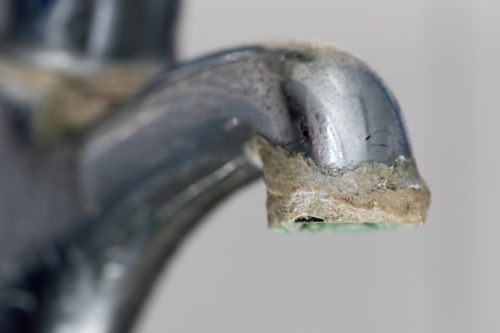
As a homeowner, you may come across a lot of hazards that can affect your home negatively. One of the most overlooked hazards is limescale buildup. Knowing how to prevent limescale buildup is your best defense against protecting your house and your property.
What Causes Limescale Buildup?
Water that has a high mineral content will naturally leave behind deposits known as limescale. The most common of these deposits are made up of calcium carbonate, which leaves behind a hard chalk-like substance that you will likely start to notice on your showerheads, dishwasher, washing machine, and faucets.
If your home develops limescale buildup over time, it can damage your appliances, clothing, and even your pipes. While limescale buildup is not dangerous to your physical health, it is something that you want to avoid. When there are larger buildups of limescale, it will affect the flow of water throughout your pipes. Additionally, it will reduce the ability of your water-reliant appliances like your washing machine or dishwasher to work effectively.
Common Indicators of Hard Water
Depending on where you live, you may have higher sediments of calcium and magnesium in your water than others. There are many indicators that will show you that your house receives hard water that can lead to limescale buildup. These include:
- Dull and scratchy clothes
- Flat and dull hair
- Dry skin and irritation
Consider Installing a Water Softener
Since limescale buildup is caused by excessive mineral content in your water, it makes sense to remove that mineral content to reduce limescale buildup. One of the best ways that you can do this is to invest in a water softener. This holds especially true if you live in areas with high mineral content water.
Water softeners use a process known as ion exchange to remove excess magnesium and calcium minerals from your water supply as it enters your home. For this process to work properly, you will need to have water softener salt. This helps to transform what was once hard water into soft water that is then delivered to the various wet rooms throughout your house.
It is important to note that you will need to check your water softener at least once a month to help ensure that it has enough salt in it to function properly. If you do not keep up with supplying salt for your water softener, it is not going to do you any good as far as removing the mineral buildup in your water.
Frequently Clean Your Appliances and Fixtures
When hard water is left on your faucets, showerheads, or other areas, it will eventually dry up and leave its mineral deposits behind. One of the best ways to help prevent limescale buildup on your appliances and fixtures is to clean them often. Simply wiping off your faucet after using it in the morning can help to remove any hard water that is left behind. When there is no hard water on your faucet, it will not develop limescale buildup.
If you start to notice white limescale buildup starting on any of your appliances or water fixtures, you need to address it right away. The longer you let that limescale build up, the harder it is going to be to remove. One of the best ways to address limescale buildup is to use a cleaning solution that is specifically designed to remove excess calcium from your water fixtures. You can typically find these cleaning solutions at your local hardware store.
White vinegar can be another great solution to help remove and prevent limescale buildup in your appliances. Take one to two cups of white vinegar and add it to your dishwasher or washing machine. Run it through a hot water cycle to help disperse and clean the vinegar throughout your appliance. You should be doing this vinegar treatment at least once a month if you live in an area that has hard water.
Use Water Filters
If you are not yet ready to invest in a water softener, you may want to purchase some water filters. These are individual filters that can be screwed onto your existing faucets and taps throughout your home. Each filter will remove high concentrations of calcium and magnesium from the water that goes through it. These water filters need to have their cartridges changed on a frequent basis. Depending on the amount of calcium and magnesium in your water, you may need to change out these filters every couple of weeks or every couple of months.
Magnetic Water Conditioner and Descaler
Another great option to help prevent limescale buildup throughout your entire house is investing in a magnetic water conditioner and descaler. These tend to be cheaper than water softeners, which can make them a more feasible choice for some homeowners. Unlike water softeners, these magnetic conditioners and descalers utilize electromagnetic coils to separate particles like calcium and magnesium from your water.
This can be a very attractive option over regular water softeners that add sodium to your family’s water. They are highly recommended for people who are on a sodium-restricted diet. With a magnetic water conditioner and descaler, there is little to no maintenance involved. After it has been installed, you simply need to turn it on and let it run. Most of these systems will last approximately 40 years.
Drain Your Water Heater Often
One extremely important appliance that your family relies on is your hot water heater. When hard water is pumped into your home, some of it goes into your hot water heater to be warmed up for use. Since there is always going to be water in your hot water tank, the high concentrates of calcium and magnesium are always going to be forming limescale buildup. For this reason, it is important that you drain your hot water heater on a frequent basis.
At the very least, you should be draining your hot water heater twice a year. If you live in an area that is prone to hard water, you will want to increase the number of times that you drain your tank to four times a year. This simple act of removing all the water out of your hot water tank and refilling it allows you to get rid of any hard water sediment that is inside of your tank. The more hard water buildup you can get rid of, the less limescale buildup you will have inside of your hot water tank.
Consult an Expert
If you are constantly dealing with limescale buildup in your home, it is a good idea to consult with an expert about how to fix the situation. A plumbing professional will be able to assess the water quality in your area and make appropriate suggestions for adequately reducing limescale buildup inside of your house. This will ensure a viable solution from the start instead of having to try multiple DIY options until you find ones that work effectively together.
Reliable Plumbing Service
APEX Plumbing offers reliable plumbing services for the entire Columbus, OH area. We are also available for all of your sewer, excavation, gas leak detection, gas line, and drain cleaning needs. Contact us today to get the professional assistance that you need!





